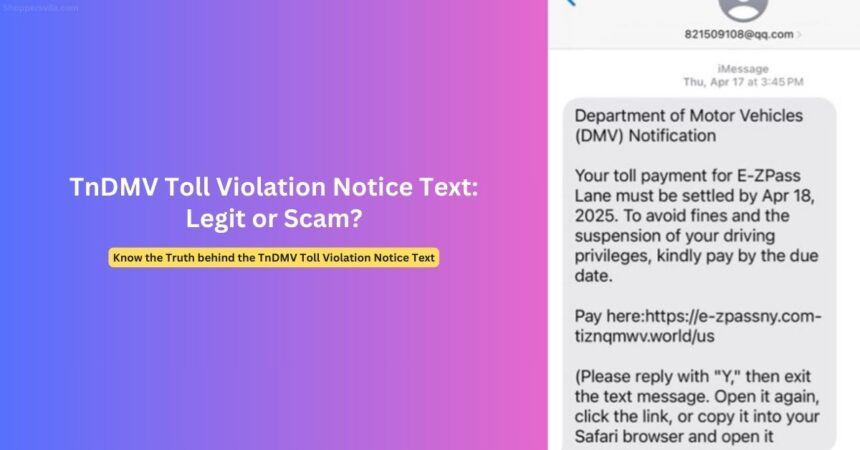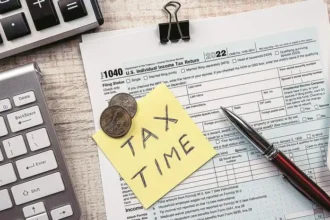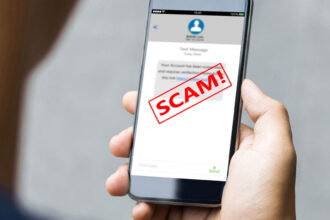Tennessee residents are increasingly being targeted by sophisticated scammers posing as the Tennessee Department of Motor Vehicles (TnDMV) with fraudulent text messages about unpaid toll violations. This growing fraud scheme has already cost Tennesseans millions of dollars, with seniors accounting for one-third of those losses. What makes these scams particularly effective is a simple fact many residents don’t realize: Tennessee currently has no toll roads.
“These toll scam texts are really annoying. They’re also really fake,” warned Tennessee Attorney General Jonathan Skrmetti in a recent statement. “We appreciate the attention brought to this scam by our law enforcement partners and the media, and advise reporting and deleting these texts as soon as they arrive.”
This comprehensive guide will help you understand how these scams work, how to identify them, and what to do if you receive one of these fraudulent messages.
Overview of the TnDMV Toll Violation Text Scam
The Tennessee Attorney General’s Consumer Protection Division, Tennessee Highway Patrol, and Tennessee Department of Transportation (TDOT) have all issued warnings about a widespread phishing scheme targeting state residents. Scammers send text messages claiming to be from official Tennessee agencies, alerting recipients about supposed unpaid toll balances that require immediate payment.
The scam has become so prevalent that the Tennessee Department of Safety and Homeland Security issued an official alert, calling it a “smishing scam” — a phishing attempt via SMS — designed to steal personal and financial information.
What makes this scam particularly dangerous is its official appearance. The messages often include:
- Official-looking government logos
- Threatening language about penalties and license suspension
- Urgent deadlines (typically 12-24 hours)
- Links to convincing but fraudulent payment portals
According to the FBI, tech scams like these cost Tennesseans more than $190 million in 2024, with seniors accounting for one-third of those losses. This toll scam represents just one vector in a growing arsenal of digital fraud techniques targeting vulnerable residents.
How the Scam Works
The scam operates through a series of calculated steps designed to create urgency and fear:
- Initial Contact: Victims receive a text message claiming to be from the Tennessee Department of Motor Vehicles, Tennessee Department of Safety, or another official-sounding agency.
- False Claims: The message states the recipient has an unpaid toll balance, typically for a small amount (often under $10) that seems plausible enough not to immediately raise suspicion.
- Urgent Threats: The text includes urgent language about impending penalties if payment isn’t made immediately, such as:
- Late payment fees
- Vehicle registration suspension
- Negative credit reporting
- Collection actions
- Suspension of driving privileges
- Fraudulent Payment Portal: Recipients who click the provided link are directed to a convincing but fake website mimicking government services. These sites often feature official-looking logos, seals, and formatting.
- Data Theft: The site requests sensitive personal and financial information, including:
- Full name and address
- Driver’s license information
- Credit card details
- Sometimes even Social Security numbers
- Identity Theft or Financial Fraud: Once scammers have this information, they can commit identity theft, drain bank accounts, make fraudulent purchases, or sell the information to other criminals on the dark web.
What makes this scam especially deceptive is that the Tennessee Department of Transportation is preparing to launch “Choice Lanes” on I-24 southeast of Nashville, which will include optional toll lanes. This legitimate development creates confusion for residents who may believe the toll messages are connected to this upcoming change.
Fake TnDMV Text Patterns: Recognizing the Warning Signs
These scam messages follow predictable patterns. Being familiar with common examples can help you identify them immediately. Here are two typical examples that have been circulating:
Example 1:
Toll Violation Notice:
This is your final notice regarding the unpaid toll balance on your account. You must settle the balance within the next 12 hours to avoid severe penalties.
Unpaid Balance: $6.99
Due Date: May 17, 2025
Failure to pay within this time frame will result in the following:
1. Immediate addition of late payment fees to your balance
2. Suspension of your vehicle registration by the Tennessee Department of Motor Vehicles (TnDMV)
3. Collection actions, including a negative report to your credit file
Please make your payment promptly to avoid these severe consequences and protect your driving privileges.
Pay Now: https://ezpass.com-eut.win/us
If the link fails, reply with ‘Y’, exit.
Example 2:
Tennessee Department of Motor Vehicles (TnDMV) Notification
Your toll payment for E-ZPass Lane must be settled by May 18, 2025. To avoid fines and the suspension of your driving privileges, kindly pay by the due date.
Pay here: https://e-zpassny.com-tiznqmww.world/us
(Please reply with “Y,” then exit the text message. Open it again, click the link, or copy it into your Safari browser and open it)
Common elements in these fraudulent texts include:
- References to E-ZPass (which does not operate in Tennessee)
- Suspicious website URLs with unusual extensions (.win, .world, etc.)
- Short payment deadlines (usually 12-48 hours)
- Instructions to reply with “Y” (which confirms to scammers that your number is active)
- Unusual phone numbers, often with international prefixes like +63
Red Flags: How to Identify These Scams
Several immediate red flags can help you identify these scam messages:
1. Tennessee Has No Toll Roads
The most obvious indicator: Tennessee currently does not have any active toll roads. The Tennessee Department of Transportation (TDOT) has explicitly confirmed this fact. Any text claiming you owe toll fees in Tennessee is automatically fraudulent.
2. Suspicious Domain Names
Legitimate government websites end with “.gov” — not “.com,” “.org,” or unfamiliar extensions like “.win” or “.world.” The URLs in these scam texts often use domain tricks like:
- Adding hyphens: “e-zpassny.com”
- Using subdomains: “ezpass.com-eut.win”
- Incorporating random characters: “tiznqmww”
3. Non-Government Sender Information
Official Tennessee government communications:
- Come from email addresses ending with “@tn.gov”
- Will not originate from Gmail, Hotmail, or other personal email domains
- Will not come from international phone numbers
- Never use QQ.com email addresses (a Chinese service often used by scammers)
4. Urgency and Threats
Government agencies don’t threaten immediate penalties via text. The urgent tone and severe consequences mentioned in these messages are designed to make you panic and respond without thinking critically.
5. Requests for “Y” Responses
Legitimate services don’t ask you to reply with “Y” to confirm receipt. This tactic helps scammers verify that your phone number is active and that you engage with messages.
6. E-ZPass References
E-ZPass is a legitimate electronic toll collection system, but it does not operate in Tennessee. It does function in some surrounding states like Kentucky and Virginia, which adds to the confusion.
How to Protect Yourself from Toll Scam Texts
Follow these essential steps to protect yourself from falling victim to these and similar scams:
Verify Before Taking Action
- Remember that Tennessee currently has no toll roads
- If you receive a text about tolls in Tennessee, it’s automatically suspicious
- When TDOT does implement “Choice Lanes” in the future, they will only text subscribers and will never request money through text messages
Check Official Sources
- Contact state agencies directly using official phone numbers or websites you look up independently (not from the text)
- The official Tennessee Driver Services website is: https://www.tn.gov/safety/driver-services.html
- For consumer protection information, visit: https://www.tn.gov/consumer
Secure Your Information
- Never provide personal or financial information in response to unsolicited texts
- Don’t click links in unexpected messages, even if they appear to be from government agencies
- Be especially wary of messages creating urgency or threats of penalties
Stay Informed
- Follow official Tennessee government social media accounts for alerts about current scams
- Check the Tennessee Attorney General’s website regularly for consumer alerts
- Discuss these scams with elderly family members who may be more vulnerable
What to Do If You Receive a Scam Text
If you receive a text message claiming to be about Tennessee toll violations, take these steps:
- Do not click any links in the message
- Do not reply to the message, even to say “STOP” or “NO”
- Report the message:
- Use your phone’s “Report Junk” option
- Forward the message to 7726 (SPAM)
- File a complaint with the FBI’s Internet Crime Complaint Center at www.ic3.gov
- Delete the message after reporting it
- Monitor your accounts if you’ve previously clicked on similar links or provided information
- Place a fraud alert on your credit reports if you believe your information has been compromised
If you’ve already responded to such a message or provided information:
- Contact your financial institutions immediately
- Change passwords for any compromised accounts
- Consider placing a credit freeze with the major credit bureaus
- Monitor your credit reports closely for suspicious activity
Frequently Asked Questions
1. Is the TnDMV “Final Reminder” or “Unpaid Toll Violation Notice” text legitimate?
No. These texts are fraudulent. Tennessee currently has no toll roads, and the Tennessee Department of Motor Vehicles does not send text messages demanding payment for toll violations.
2. If I haven’t driven on a toll road, can I still get legitimate toll charges?
If you’re a Tennessee resident who hasn’t driven on toll roads in other states, any toll violation notice is almost certainly fraudulent. However, if you’ve recently driven in states with toll roads, you should verify any charges through official channels, not via links in text messages.
3. How can I verify if I actually owe money to the TnDMV?
You can check if you owe any fees to the Tennessee Department of Safety and Homeland Security by visiting their official website (www.tn.gov/safety) or calling their official phone number. Never use contact information provided in suspicious texts.
4. What information should I never share in response to text messages?
Never share your Social Security number, credit card information, bank account details, driver’s license number, or passwords via text message. Legitimate government agencies don’t request this information through unsolicited texts.
5. Will the upcoming “Choice Lanes” on I-24 change how toll payments work?
When TDOT implements the optional toll “Choice Lanes” in the future, they will establish official payment channels. According to TDOT, they will only text subscribers who opt in and will never request money through text messages.
Conclusion
The TnDMV toll violation text scam represents just one example of how fraudsters continuously adapt their tactics to exploit public trust in government institutions. As Tennessee prepares to implement actual toll lanes in the future, we can expect scammers to refine their approaches to create even more convincing fraudulent messages.
Remember the most important fact: currently, there are no toll roads in Tennessee. Any text claiming you owe toll fees in Tennessee is automatically suspicious and likely fraudulent.
By staying informed, questioning unexpected messages, and verifying information through official channels, you can protect yourself and your loved ones from these increasingly sophisticated digital threats. If you receive suspicious texts, report them to help authorities track and combat these scams more effectively.
Tennessee residents seeking more information about consumer protection and current scams can visit the Tennessee Attorney General’s consumer website at www.tn.gov/consumer or call the Consumer Protection Division at 615-741-4737.
This article was created by Shoppersvila.com based on official warnings and information from the Tennessee Attorney General’s Office, Tennessee Department of Transportation, Tennessee Highway Patrol, and the Federal Trade Commission. Last updated: May 17, 2025.









































